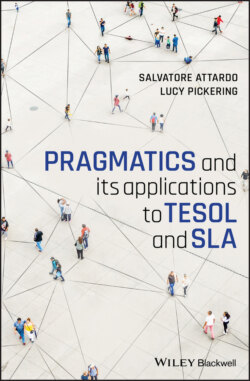Читать книгу Pragmatics and its Applications to TESOL and SLA - Salvatore Attardo - Страница 49
Notes
Оглавление1 1. There is a little irony here, namely that Wittgenstein was a Cambridge philosopher and apparently Austin did not like his work and claimed not to have been influenced by it (see Searle, 2007). Nonetheless, the similarities are significant, but are probably due to the general cultural context, what the Germans would call the Zeitgeist, the “spirit of the times.”
2 2. Suppose that Attardo asked Pickering today if she’ll marry him; the question would be non-felicitous, because they are already married and by cultural and legal convention you cannot remarry the same person if you are currently married to them.
3 3. The alert reader will notice that there are some differences between this list and the one from 1969. The reasons for the differences are technical and are discussed in Searle (1979). The Searle1969 list is not meant to be exhaustive and is a list of illocutionary forces; the Searle1979 list is a list of speech acts and is meant as a list of “basic categories” (p. 12) of speech acts.
4 4. There is a use of the expression I am sorry that X, which is intended to convey solidarity but can be taken as an apology. It is not, because the apology would be infelicitous. We have both witnessed speakers respond, You don’t have to apologize, it’s not your fault.
